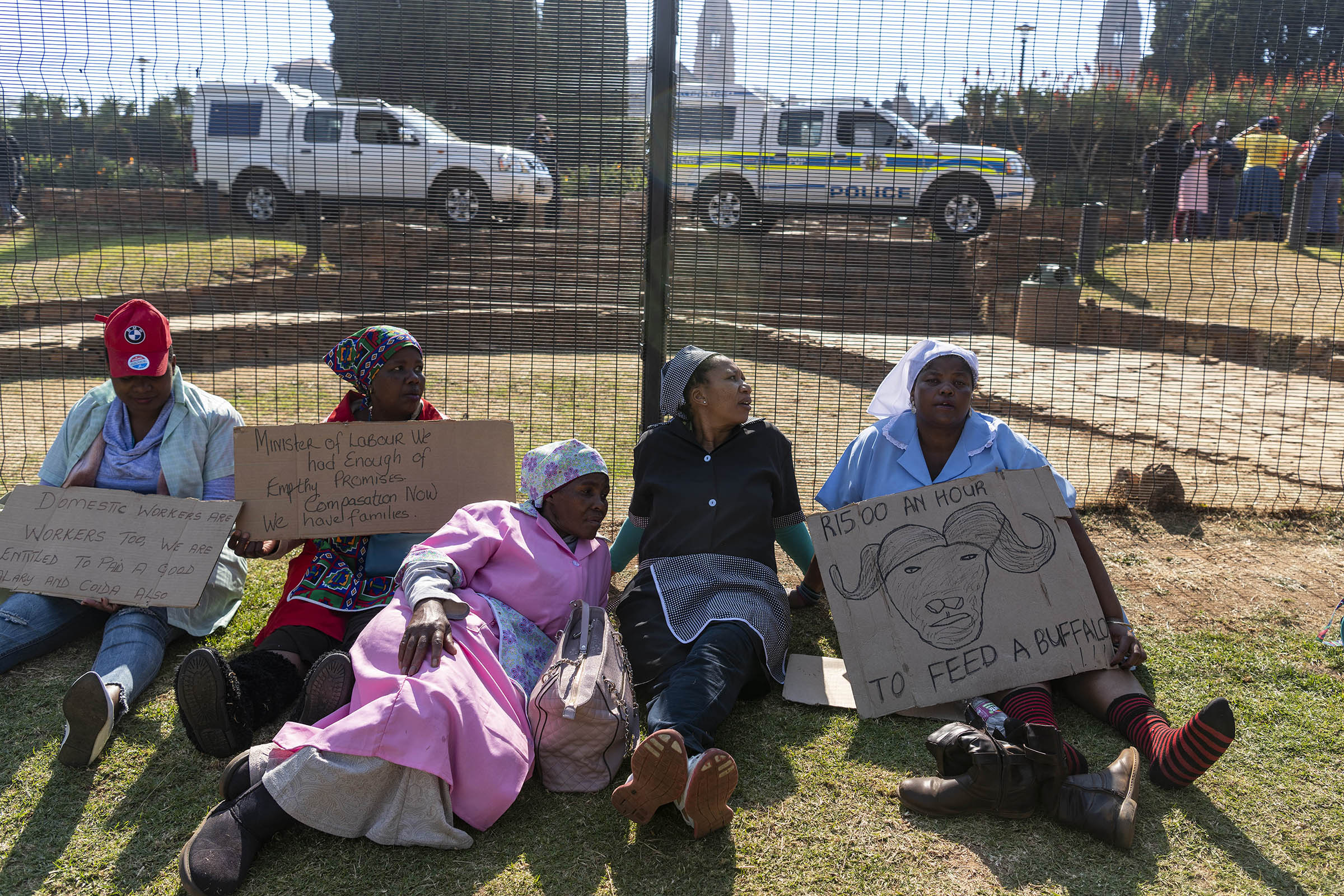Workers want one minimum wage for all
A coalition of workers and worker rights groups wants the discriminatory tier system scrapped as some earn less than the national minimum wage, which is already insufficient as a living wage.
Author:
27 January 2020

The One Wage Campaign is calling on the National Minimum Wage Commission to phase out the minimum wage system and replace it with one wage structure that applies to all.
In its current form, the national minimum wage of R20 an hour is not extended to all workers. Domestic workers, for example, get R15 an hour, farm workers R18 an hour and Expanded Public Works Programme (EPWP) workers only R11 an hour. According to the National Minimum Wage Act, the National Minimum Wage Commission, the body established to oversee the implementation of the legislation, has a mandate to review the minimum wage annually.
Commission chair Adriaan van der Walt says that following a 13 January meeting of the commission to discuss changes to the national minimum wage, it is now in a position to submit a report to the minister as required by the act and will file it in the coming weeks. The report will be made public.
Related article:
In November, the One Wage Campaign – a coalition of domestic, farm and EPWP workers, worker unions and workers’ rights organisations – made submissions to the commission in anticipation of the annual review of the national minimum wage in 2020. Central to the submissions was the issue of wage parity across sectors: if the national minimum wage is R20 an hour, all workers should get it.
The One Wage Campaign is inspired by the fact that the United Nations’ International Labour Organization prefers a unitary minimum wage. They contend that South Africa should align itself with global trends, especially as regards the minimum wage. Countries such as Chile, Portugal, Guatemala and Paraguay have successfully phased out tiered systems and have one national minimum wage, which has contributed towards reducing inequality.
Right to equality and dignity
Izwi Domestic Workers Alliance cofounder and One Wage Campaign coordinator Amy Tekié says excluding workers from marginalised sectors from getting the full national minimum wage goes against the very purpose of the act. “It’s not just an issue about the wages, it is an issue about equality and dignity,” she says.
For Tekié, the differentiation undermines the value of work done by farm, domestic and EPWP workers.
“Where every other worker gets R20 an hour, to [then] say to a domestic worker, but you only deserve R15 an hour, what does that say about the value of your work? It says it’s less important than the work everybody else in the country is doing, which is absolutely not true. And the same for farm workers. For goodness sake, they are growing our food and there is nothing more important than that,” adds Tekié.
Moses Sekobane of the Rural Legal Trust, an organisation that works closely with farm workers in rural areas, echoes Tekié’s sentiments. “Currently, when you speak about minimum wage, there are workers who cannot even earn more than R2 000. Sometimes they give them R1 500 to R1 900 [a month], you know.”
He adds that some rural farm workers are not paid hourly rates, which should be no less than R18 an hour, but are paid per amount of sacks or boxes they finish packing. “So, if they can’t meet that required stock, they don’t have a salary at the end of the month. They are working long hours without overtime. They don’t have leave pay. It’s a disaster in the rural areas,” says Sekobane. As a result of low wages, most workers end up being dependent on loan sharks, he adds.

Farm workers, says Sekobane, that demand to be registered with the Unemployment Insurance Fund and other benefits are dismissed. Even labour inspectors hardly go to farms anymore. In the past, when they would visit, they would only see the employer behind closed doors, never bothering to speak to workers.
For workers with the EPWP programme, it may be worse. They earn R11 an hour and there is no guarantee that this will change.
“It is an insult to be paid such a wage or, shall I say, a stipend. Although we work hard long hours, sleepless nights. Sometimes we wish the government [could] interfere. I feel depressed and discouraged every day [even though] I love my job. But it is not fair to be paid money that only lasts 30 minutes on groceries and paying off loan sharks,” says one EPWP worker quoted anonymously in the One Wage Campaign submission to the commission.
The work of EPWP workers is supposed to be temporary. But for some, it goes on for years, explains Tekié. They do similar work as permanent state employees, but are paid less and receive no benefits.
Van der Walt says the commission’s recommendations will pertain to a percentage increase in the national minimum wage for all sectors, including EPWP workers. He did not disclose the exact percentage of the increase.
Not a living wage
The One Wage Campaign says the national minimum wage of R20 an hour is not a living wage. In making this claim, they are relying on the November 2019 household index by the Pietermaritzburg Economic Justice and Dignity Group. The group claims that R20 an hour is not enough for one to lead a decent and dignified life as it barely covers the cost of electricity, food and transport.
For a worker to afford the most basic of essentials, such as food and shelter, and to the exclusion of other needs like school transport, hygiene items and burial insurance, the Pietermaritzburg economists recommend a minimum wage rate of at least R25 an hour.
With the national minimum wage of R20 an hour not meeting the basic needs of workers, it is astounding how the state expects domestic, farm and EPWP workers to survive on even less, says Tekié.
Related article:
According to One Wage Campaign, almost 90% of farm workers and more than 95% of domestic workers earn below the poverty line. Women make up the majority of both sectors and are more likely to be the working poor than men. The One Wage Campaign wants this to change.
While Van der Walt agrees that R20 an hour is not sufficient as a living wage, he wouldn’t say exactly what the commission’s recommendations are and what rate it plans to eventually reach for all workers.
No need to wait
As per the act, domestic and farm workers will be phased in two years from the date the act came into law.
Van Der Walt confirms this, saying that “concerning the lower minimum wage for domestic and agricultural workers, the NMWC [commission] is required to make recommendations concerning parity by the end of June 2020 to take effect on 1 January 2021. That will be done timeously as required by the NMW Act based on research results that are still pending at the moment.”
He went on to say that “there is no specific reference in the NMW Act to recommend parity for EPWP workers in the same manner. This issue will be debated by the NMWC during the deliberations concerning the parity of the minimum wage for farm and domestic workers.”
But the One Wage Campaign says the commission and the minister are not obliged by law to wait for the period of two years to adjust the national minimum wage for domestic and farm workers. The minister must act more swiftly, it says, given the “constitutional violations” currently being perpetuated. The disparity in the national minimum wage must be “wholly” eradicated, says the One Wage Campaign.
Sanja Bornman, an attorney from Lawyers for Human Rights, which represents the One Wage Campaign, says the current exclusions violate the Constitution.
“When law or policy treats certain groups of people less favourably than others, as the NMW Act does, there had better be a compelling reason to do so, especially if those groups have historically been disadvantaged and exploited. Based on the current economic evidence, there simply is no good reason for the existence, or continuation, of the tiered system. This means that the tiered system constitutes unfair discrimination, in that it unreasonably and unjustifiably limits the rights, particularly the right to dignity, of domestic workers, farm workers and EPWP workers,” says Bornman.


